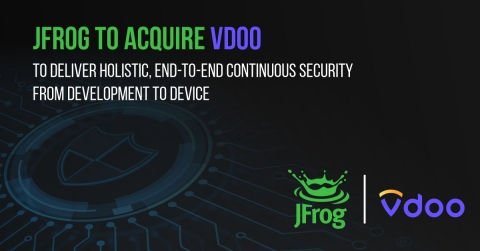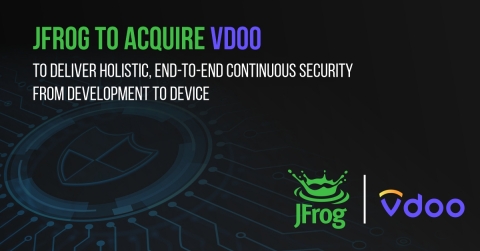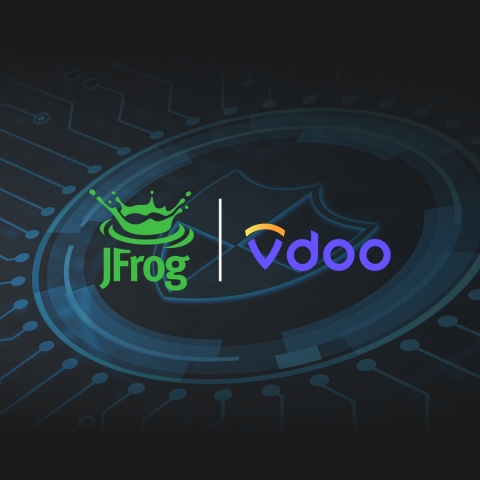SUNNYVALE, Calif.--(BUSINESS WIRE)--JFrog Ltd. (“JFrog”) (NASDAQ: FROG), the liquid software company, today announced that it has entered into a definitive agreement to acquire Vdoo Connected Trust Ltd. (“Vdoo”) in a cash and stock-based deal valued at approximately $300 million.
JFrog has accelerated its efforts to provide an industry-leading security offering to support DevOps users as they respond to the disruption in the market for continuous software delivery. As part of the JFrog Platform, Vdoo will accelerate JFrog’s vision of becoming the company behind all software updates and creating a world of Liquid Software by expanding its end-to-end DevOps Platform offering, providing holistic security from the development environment all the way to edges, IoT and devices.
Vdoo’s world-class security experts and vulnerability researchers will join the JFrog team to continue to develop advanced security solutions for developers and security engineers. With years of extensive experience in software architecture and vulnerability research, reverse engineering, and binary code analysis, Vdoo’s team and JFrog will seek to deliver a complete DevSecOps solution to secure the full software packages lifecycle.
Holistic Approach to Security Meets Market Demand, Providing Fast and Secure Software Updates
Many of today’s DevOps solutions are missing proper security capabilities that are fully integrated into the software lifecycle. Security tools are disparate, each with its own data set, which creates friction between development and security teams, slowing the releases of software updates - especially when continuously delivering to the edge or across a large fleet of devices. As a result, many of these security tools are not delivering on the promise of fast, automated, and secure releases.
The market demands a holistic process that secures software components all the way to the edge, consolidates security data for efficient decision-making, saves time and resources, and blesses an end-to-end delivery system with the highest integrity for security-certified releases -- from any source to any endpoint.
“We are excited to have Vdoo join the JFrog family,” said Shlomi Ben Haim, co-founder and CEO of JFrog. “It is clear to us that the joint vision of changing the way software is being created, released, and updated to the edge will be our compass as we offer the market a binary-focused solution to secure their organization’s software assets. This move will amplify JFrog's current success with our security solution, JFrog Xray, and create the expectation that ‘fearless releases’ will be the experience for both Security and Development teams.”
"This proposed acquisition is a great fit for both our companies,” said Netanel (Nati) Davidi, co-founder and CEO of Vdoo. “We share a vision around DevOps and security: if any DevOps company isn’t also a security company, it is solving only a small piece of the puzzle. We're proud that our team has focused on being hybrid and holistic, and integrated across all dimensions throughout the software delivery life cycle. We look forward to continuing to power this Liquid Software mission as part of JFrog, and anticipate industry-changing innovations from the joint team."
The DevSecOps Value, Delivered
Vdoo’s technology for analyzing and securing software packages will fuel JFrog’s security and runtime technology expansion, with the anticipated following benefits to JFrog customers, security engineers and the developer community:
- Saving resources with improved efficiency and high accuracy: Contextual threat analysis with advanced algorithmic applicability scanning that prioritizes critical security gaps across multiple vectors
- Zero-Day detection: Ability to automatically detect zero-day new vulnerabilities, malware, exploits, backdoors, supply chain risks, and other threats before they become public
- Accelerated mitigation: Actionable mitigation recommendations across multiple attack vectors cut to the bottom line, avoiding teams’ “alert-fatigue” and noise when having to sift through thousands of possible vulnerabilities
- IoT and Embedded device security: Extending security to embedded software on devices/IoT, along with firmware scanning and uniquely identifying vulnerabilities in compiled C/C++ application components
- Configuration security: Detecting configuration risks and implementation gaps (over 400 types of tests)
- Runtime protection for embedded devices: Alerting and blocking exploitation attempts in real-time
- Deeper, research-based coverage: Identify known and unknown security risks and improved prioritization and mitigation capabilities
- Standards compliance: Matching any security risk found to more than 40 (to date) different security standards and regulations
JFrog’s Security Road Map
As part of the integration process, JFrog will triple the size of its security experts team - including engineering, marketing, and sales - with employees that will be located in Israel, Germany, Japan and North America.
In 2021, JFrog will expand JFrog Xray vulnerability detection to include Vdoo’s extensive data and improved scanning across multiple dimensions, including configuration and applicability scanning. In addition, JFrog expects to fully integrate Vdoo’s technology into its DevOps platform to provide an industry-leading, all-in-one, continuous, holistic secured platform in 2022.
In the immediate term, Vdoo’s SaaS product will remain in operation, with new development of features and functions focusing on the JFrog Platform solution. Following the completion of the acquisition, JFrog and Vdoo will work with customers to ensure business continuity and streamlined migration to the joint offering.
Transaction Details
Under the terms of the definitive agreement, JFrog has agreed to acquire Vdoo for a total purchase price of $300 million subject to adjustments as set forth in the purchase agreement for cash free debt free basis, to be paid in a combination of cash and share consideration. Of the purchase price, approximately $90 million will be paid with JFrog ordinary shares based on the average close price of the shares during the last 15 trading days.
JFrog Reiterates Q2 and FY2021 Guidance
JFrog reiterated the financial guidance provided on May 6, 2021.
For the second quarter ended June 30, 2021, JFrog expects revenues of $47.6 million to $48.6 million, with non-GAAP operating income of $0.5 million to $1.5 million and non-GAAP EPS of $0.00 to $0.01, assuming approximately 104 million weighted average diluted shares outstanding. For Full Year 2021, revenues are expected to be $198 million to $204 million, with non-GAAP operating income between $5 million and $7 million and an approximately 3% increase in weighted average diluted shares.
Subject to the closing of the proposed acquisition, JFrog anticipates its consolidated operating expenses to increase by approximately $9-10 million for the remainder of 2021.
Conference Call Information
JFrog will hold a conference call to discuss this transaction today, June 29, 2021, at 8:30 a.m. ET/5:30 a.m. PT. The live webcast and a replay of the webcast will be available at the investor relations section of JFrog’s website at https://investors.jfrog.com/events-and-presentations/events.
About JFrog
JFrog, the creator of the DevOps platform, is on a “Liquid Software” mission to enable the flow of software seamlessly and securely from the developer’s keystrokes to production. The end-to-end, hybrid JFrog Platform provides the tools and visibility required by modern software development organizations to fully embrace the power of DevOps. JFrog’s universal, multi-cloud DevOps platform is available as open-source, self-managed and SaaS services on AWS, Microsoft Azure and Google Cloud. JFrog is trusted by millions of users and thousands of customers, including a majority of the Fortune 100 companies that depend on JFrog solutions to manage their mission-critical software delivery pipelines. Learn more at jfrog.com.
Cautionary Statement
This press release contains “forward-looking” statements, as that term is defined under the U.S. federal securities laws, including but not limited to statements regarding JFrog’s future financial performance, our projected guidance for the quarter ending June 30, 2021 and fiscal year ending December 31, 2021, our leadership position in the markets in which we participate, our ability to meet market demands and our expectations regarding the proposed acquisition of Vdoo by us, including our ability to complete the potential transaction, the proposed timetable for completing the potential transaction, our ability to successfully integrate the proposed acquisition into our business operations, including the DevOps platform, and realize anticipated benefits and synergies from the proposed acquisition. These forward-looking statements are based on JFrog’s current assumptions, expectations and beliefs and are subject to substantial risks, uncertainties, assumptions and changes in circumstances that may cause JFrog’s actual results, performance, achievements to differ materially from those expressed or implied in any forward-looking statement.
By their very nature, forward-looking statements involve inherent risks and uncertainties, both general and specific, which give rise to the possibility that expectations, predictions, forecasts, projections and other forward-looking statements will not be achieved. Certain material factors or assumptions are applied in making forward-looking statements and actual results may differ materially from those expressed or implied in such statements. JFrog cautions readers not to place undue reliance on these statements as a number of important factors, many of which are beyond our control, could cause JFrog’s actual results to differ materially from the beliefs, plans, objectives, expectations, anticipations, estimates and intentions expressed in such forward-looking statements. These factors include, but are not limited to, our ability to timely and successfully complete the proposed acquisition, our ability to successfully integrate Vdoo’s technology into our offerings; our and Vdoo’s ability to provide continuity to each of our respective customers following the proposed acquisition, and our ability to realize innovations following the proposed acquisition. Additional risks applicable to JFrog are identified in our filings with the Securities and Exchange Commission, including our annual report on Form 10-K for the year ended December 31, 2020, our quarterly report on Form 10-Q for the quarter ended March 31, 2021, and other filings and reports that we may file from time to time with the Securities and Exchange Commission.
Forward-looking statements represent our beliefs and assumptions only as of the date of this press release. We assume no obligation and do not intend to update these forward-looking statements, except as required by law or applicable regulation.
About Non-GAAP Financial Measures:
JFrog discloses the following non-GAAP financial measures in this release and the call referencing this press release: non-GAAP operating income (loss) and non-GAAP net income (loss) per diluted share. JFrog uses each of these non-GAAP financial measures internally to understand and compare operating results across accounting periods, for internal budgeting and forecasting purposes, for short- and long-term operating plans, and to evaluate JFrog’s financial performance. JFrog believes they are useful to investors, as a supplement to GAAP measures, in evaluating its operational performance, as further discussed below. JFrog’s non-GAAP financial measures may not provide information that is directly comparable to that provided by other companies in its industry, as other companies in its industry may calculate non-GAAP financial results differently, particularly related to non-recurring and unusual items. In addition, there are limitations in using non-GAAP financial measures because the non-GAAP financial measures are not prepared in accordance with GAAP and may be different from non-GAAP financial measures used by other companies and exclude expenses that may have a material impact on JFrog’s reported financial results.
Non-GAAP financial measures should not be considered in isolation from, or as a substitute for, financial information prepared in accordance with GAAP.
A reconciliation of non-GAAP guidance measures to corresponding GAAP measures is not available on a forward-looking basis without unreasonable effort due to the uncertainty regarding, and the potential variability of, reconciling items that may be incurred in the future such as share-based compensation, the effect of which may be significant.
JFrog defines non-GAAP operating income (loss) and non-GAAP net income (loss) per diluted share as the respective GAAP balance, adjusted for, as applicable: (1) share-based compensation expense; (2) the amortization of acquired intangibles; (3) acquisition-related costs and (4) income tax effects. Investors are encouraged to review the reconciliation of these historical non-GAAP financial measures to their most directly comparable GAAP financial measures.
Management believes these non-GAAP financial measures are useful to investors and others in assessing JFrog’s operating performance due to the following factors:
Share-based compensation. JFrog utilizes share-based compensation to attract and retain employees. It is principally aimed at aligning their interests with those of its shareholders and at long-term retention, rather than to address operational performance for any particular period. As a result, share-based compensation expenses vary for reasons that are generally unrelated to financial and operational performance in any particular period.
Amortization of acquired intangibles. JFrog views amortization of acquired intangible assets as items arising from pre-acquisition activities determined at the time of an acquisition. While these intangible assets are evaluated for impairment regularly, amortization of the cost of acquired intangibles is an expense that is not typically affected by operations during any particular period.
Acquisition-related costs. Acquisition-related costs include expenses related to acquisitions of other companies. JFrog views acquisition-related costs as expenses that are not necessarily reflective of operational performance during a period.
Income tax effects. JFrog’s non-GAAP financial results are adjusted for income tax effects related to these non-GAAP adjustments and changes in our assessment regarding the realizability of our deferred tax assets, if any. Excluding income tax effects of non-GAAP adjustments provides a more accurate view of JFrog’s operating results.
Non-GAAP weighted average share count. JFrog defines non-GAAP weighted-average shares used to compute non-GAAP net income (loss) per share, basic and diluted, as GAAP weighted average shares used to compute net income (loss) per share attributable to common shareholders, basic and diluted, adjusted to reflect the ordinary shares issued in connection with the IPO that are outstanding as of the end of the period as if they were outstanding as of the beginning of the period for comparability.




